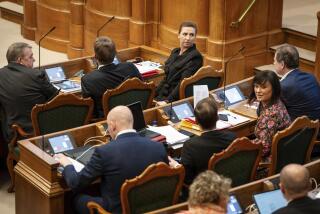What would Muhammad do?
ON FRIDAY, I sat on the carpet listening to the sermon at an L.A. mosque. The topic was expected and familiar: a denunciation of the publication of the offensive cartoons that have had the Muslim world up in arms. I directed my eyes to the carpet so no one could see the disgusted look on my face. “Not again,” I thought. “Don’t we Muslims ever get tired of complaining?”
The khateeb (the person delivering the sermon) stated that it was not right that Islam was the target of abuse. He said some will go out of their way to disrespect Islam. He said the Muslim community demands an apology, and (thankfully) he called on Muslims to be peaceful and forgiving.
I left the mosque thinking about how non-Muslims must be viewing the situation. Based on the pictures and stories in the media, on escalating demands and violence around the world, they are getting a false picture of Islam.
Can they help but think that Muslims are violent? Several newspapers have reported that some Muslim leaders have called for the deaths of those who published the cartoons. Muslims have burned Danish flags and destroyed Danish embassies in Muslim countries; people have died in the protests.
The violent response also makes it seem that the cartoons are worth viewing, that they are important. If the intent is to prevent people from seeing offensive images about Islam, the tactic has backfired. Everyone (including me) now wants to view the cartoons.
And Muslims appear to have a double standard. We cry out that Islam should not be desecrated, but in several countries where the majority is Muslim, it is illegal or incredibly difficult for minority religions to build churches, synagogues or temples. Moreover, in some parts of the Muslim world, cartoons that could be considered anti-Christian or anti-Jewish are common.
Finally, it seems as if Muslims do not believe in freedom. Those of us living in the West say that we cherish the liberty to practice our religion and express our views, even if our actions may offend the sensitivities of our non-Muslim neighbors. Yet when others express views that are offensive to Muslims, there is no tolerance.
Do Muslims hold a defensible position in this affair? I know the intellectual, religious and legal arguments used to defend the position that such cartoons should never be published: Muslims respect the figures from the Abrahamic faiths, including Moses, Jesus and Mary. Why can’t others reciprocate?
Yet to ask 5 billion non-Muslims to respect a particular code of ethics is unrealistic. And even if most non-Muslims exercise restraint, there are always individuals willing to exceed the boundaries.
Another complaint made by my fellow Muslims is that we alone are the victims. This argument is flatly false. Christians have felt victimized by the movie “The Last Temptation of Christ,” and there are many who object to the soon-to-be-made film based on the bestseller, “The Da Vinci Code.” Judaism is the basis of jokes, cartoons and films considered to be anti-Jewish -- the most recent film being “The Passion of the Christ.”
Muslims only enlarge the supposed bull’s-eye on Islam when we go overboard in our reactions to anti-Muslim actions. The honor of Islam will survive petty mudslinging without rioting.
Where do we go from here? Unfortunately, the damage on all sides has been done. If the Danish government offers an apology, Muslims will be viewed as bullies capable, through their use of violence, of squashing free speech. If the Danes refuse to apologize, the West will be viewed as the victor over a fanatic religion that must be put in its place. Either outcome spells disaster for Muslims in non-Muslim public opinion.
Some Muslims may say that public opinion does not matter when it comes to Islam. Yet if one examines the life of the prophet Muhammad, one would conclude that he carefully considered public opinion. When he negotiated a treaty with Arabs who were at war with him, he did not insist that his title as “prophet” be placed in the document (this act horrified his companions, to the point where they thought it was sacrilege). Instead, he had his name written as simply Muhammad, the son of Abdulla. This placated his enemy and was essential to successfully concluding the treaty, which gave the Muslims an extended period of peace that allowed them to publicize Islam. In fact, the opportunity the treaty created may be responsible for Islam’s existence.
Yes, the prophet cared deeply about public opinion. Now if only Muslims would follow his lead. We need to learn to ignore these insignificant attacks and focus Muslims’ attention on immensely more important issues: homelessness, world hunger, the widening gulf that separates rich and poor, and freedom.
More to Read
Sign up for Essential California
The most important California stories and recommendations in your inbox every morning.
You may occasionally receive promotional content from the Los Angeles Times.










